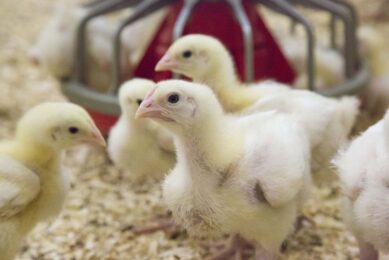How do you measure performance in the poultry industry?

In the United States and Canada, the poultry industry’s standard performance measurement is the feed conversion ratio (FCR). Calculating FCR is as simple as taking the total amount of feed consumed by the flock and dividing it by the amount of weight gained or the number of eggs produced. In other words, FCR equals input divided by output.
For broiler producers, an FCR of 1.6 means that their chickens gain 1 kilogram of weight for every 1.6 kilograms of feed consumed. The lower the FCR, the more efficient animals are at converting feed into food.
Reduced feed conversion ratio in poultry industry
Since the 1980s, poultry producers have been able to reduce their feed conversion ratios from producing a bird weighing 2 kilograms in 70 days with an FCR of 2.5 to a bird weighing the same in 29 days with an FCR of 1.5 today. This means that fewer grains are being used to produce more meat and eggs. The industry made this leap using 2 key strategies:
- genetic improvements
- the inclusion of exogenous enzymes.
Exogenous enzymes allow producers to get more energy, phosphorus and amino acids from their diets, and the international unit for measuring enzyme activity is the katal. The katal represents 1 mol of substrate per second; however, the most valued unit for comparative purposes in the animal industry is the amount of the enzyme in milligrams needed to catalyse the reaction of a particular substrate, releasing 1 micromol of a final product in one minute.
Determining the effect of enzyme inclusion
It is far more difficult for producers to determine the effect a particular enzyme will have on their flock’s efficiency. Most producers will need to run field trials in order to see how the inclusion of a particular enzyme will impact their FCR. These trials can be complicated, due to the number of variables involved, and they can be very expensive, too.
Being able to measure how effective a particular diet is at providing nutrients for digestion before it is fed to the animals can give a great advantage to poultry producers. Tools like Alltech True Check in vitro screening can allow producers to do just that. True Check simulates poultry digestion in the lab utilising samples of feed. This tool mimics the real life conditions of the animal’s digestive system and shows producers the amount of nutrients that are being released for digestion.
Improve flock performance through measuring
With this tool, producers can do side-by-side comparisons of multiple feeding strategies and choose the one that will minimise their FCR and improve their flock’s performance the most.
Measuring and projecting performance allows poultry producers to choose the feeding strategy that reduces their feed costs and, as a result, gives them the best chances for increasing profitability. After all, the industry can only improve what it can measure.






